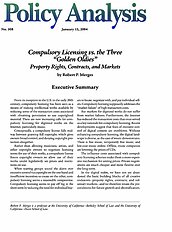From its inception in the U.S. in the early 20th century, compulsory licensing has been seen as a means of making intellectual works available by reducing some of the transaction costs associated with obtaining permission to use copyrighted material. There are now increasing calls for compulsory licensing for digitized works on the Internet, particularly music.
Conceptually, a compulsory license falls midway between granting full copyright, which gives owners broad control, and denying copyright protection altogether.
Rather than allowing musicians, artists, and other copyright owners to negotiate licensing terms for use of their works, a compulsory license forces copyright owners to allow use of their works under legislatively set prices and restrictions on use.
When warring groups sound the alarm over excessive control via copyright on the one hand and insufficient incentives to create on the other, compulsory licensing seems a reasonable compromise. Compulsory licensing seems to pay off big in the short term by reducing the need for individual buyers to locate, negotiate with, and pay individual sellers. Compulsory licensing supposedly addresses the “market failure” of high transaction costs.
But markets for digitized works do not suffer from market failures. Furthermore, the Internet has reduced the transaction costs that once served as a key rationale for compulsory licensing. Recent developments suggest that fears of excessive control of digital content are overblown. Without enhancing compulsory licensing, the digital landscape is diverse, as the case of music demonstrates. There is free music, temporarily free music, and low-cost music online. Offline, music companies are lowering the prices of CDs.
The influence costs associated with compulsory licensing schemes make them a more expensive mechanism for setting prices. Private negotiations are much cheaper and more flexible over the long term.
In the digital realm, we have not yet abandoned the basic building blocks of all creative endeavors–property rights, contracts, and voluntary markets–and we therefore retain the preconditions for future growth and diversification.
About the Author

This work is licensed under a Creative Commons Attribution-NonCommercial-ShareAlike 4.0 International License.
